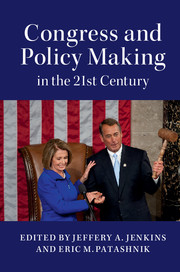Book contents
- Frontmatter
- Contents
- List of Figures
- List of Tables
- List of Contributors
- Acknowledgments
- 1 The Evolving Textbook Congress: Polarization and Policy Making on Capitol Hill in the 21st Century
- PART I CONGRESSIONAL POLICY MAKING IN A POLARIZED AGE
- PART II CONGRESS AND SOCIETY
- PART III CONGRESS AND ECONOMIC POLICY
- 6 Congress Makes Tax Policy: Democrats and Republicans at Two Critical Junctures
- 7 The Decline of Regular Order in Appropriations: Does It Matter?
- 8 Congress and the Federal Reserve: Independence and Accountability
- PART IV CONGRESS AND DOMESTIC POLICY DILEMMAS
- PART V REFLECTIONS
- Index
- References
8 - Congress and the Federal Reserve: Independence and Accountability
from PART III - CONGRESS AND ECONOMIC POLICY
Published online by Cambridge University Press: 05 February 2016
- Frontmatter
- Contents
- List of Figures
- List of Tables
- List of Contributors
- Acknowledgments
- 1 The Evolving Textbook Congress: Polarization and Policy Making on Capitol Hill in the 21st Century
- PART I CONGRESSIONAL POLICY MAKING IN A POLARIZED AGE
- PART II CONGRESS AND SOCIETY
- PART III CONGRESS AND ECONOMIC POLICY
- 6 Congress Makes Tax Policy: Democrats and Republicans at Two Critical Junctures
- 7 The Decline of Regular Order in Appropriations: Does It Matter?
- 8 Congress and the Federal Reserve: Independence and Accountability
- PART IV CONGRESS AND DOMESTIC POLICY DILEMMAS
- PART V REFLECTIONS
- Index
- References
Summary
In his last press conference as chairman of the Federal Reserve's Board of Governors in 2013, Ben Bernanke was asked what advice he would offer Janet Yellen, the incoming chair, for dealing with Congress. Bernanke kept it simple: “Congress is our boss” (Federal Reserve 2013, 29). The Federal Reserve's (or Fed's) relationship with Congress is hardly that straightforward. Indeed, Bernanke immediately added: “It is important that we maintain our policy independence in order to be able to make decisions without short term political interference.” Bernanke's advice and admonition highlight the inevitable tension for Congress between insulating monetary policy from political pressure and holding the Fed accountable for its policy decisions.
The trade off between independence and democratic accountability is most apparent in the wake of financial and economic crises with interest rates at zero and central banks compelled to break the glass, tapping unconventional tools to ease policy further. Indeed, the recent global financial crisis reveals the limits of central bank independence. In the United States, Europe, and Japan, politicians have renewed their focus on central banks – replacing governors, revamping lending powers, and demanding greater accountability. Heightened oversight of monetary policy contrasts sharply with studies of central bank autonomy: Politicians are said to prefer independent central banks because more independent monetary authorities aim to deliver lower and more stable inflation (Alesina and Summers 1993). Committing in advance to central bank autonomy in theory prevents politicians from interfering with monetary policy to ease conditions for electoral gain.
Why and when do politicians threaten to revise the degree of independence they afford their central banks? And how does the current state of partisan polarization – coincident with the worst financial crisis since the Great Depression – affect how lawmakers react to the Fed's implementation of monetary policy? In this chapter, we focus on Congress's relationship with the Federal Reserve in the postwar period. First, we offer a framework for understanding how lawmakers influence monetary policy given expectations of central bank independence. We argue that Congress and the president largely shape monetary policy indirectly: setting goals for the Fed, reforming Fed governance, and imposing greater transparency. Second, we explore the conditions under which lawmakers threaten to change the Fed's goals, governance, or accountability.
- Type
- Chapter
- Information
- Congress and Policy Making in the 21st Century , pp. 187 - 208Publisher: Cambridge University PressPrint publication year: 2016
References
- 2
- Cited by



